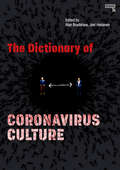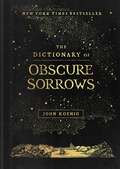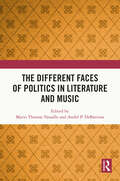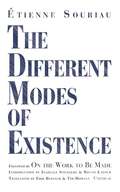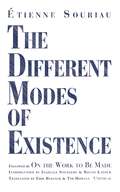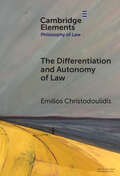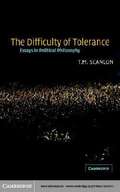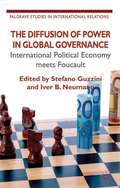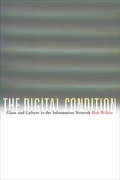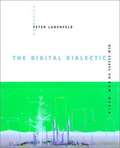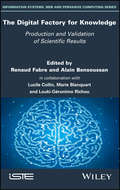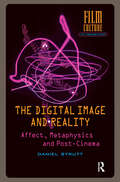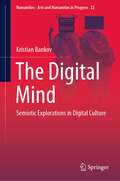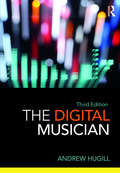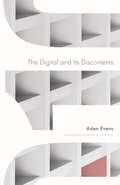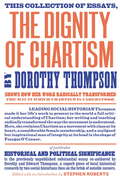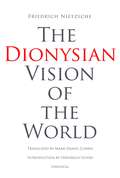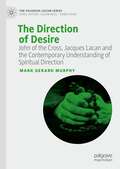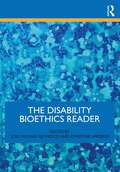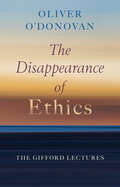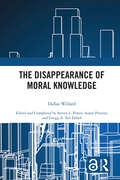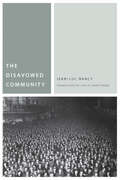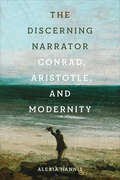- Table View
- List View
The Dictionary of Coronavirus Culture
by Alan Bradshaw and Joel HietanenThe Dictionary of Coronavirus Culture presents an A-Z of life in lockdown. Taking everyday terms that capture the lived experience of lockdown — like chocolate, streaming, ageing, health, clapping, social distancing, dystopia, and frontline workers — and discussing them with a range of writers, theorists, and academics, it provides unusually accessible and friendly analysis of our shared historic moment. With contributions from Lynne Segal, Jo Grady, Kate Soper, Stefano Harney, and many more, The Dictionary of Coronavirus Culture is designed to help us come to terms with what COVID-19 and the associated lockdowns mean for us, and the world around us.
The Dictionary of Obscure Sorrows
by John KoenigA truly original book in every sense of the word, The Dictionary of Obscure Sorrows poetically defines emotions that we all feel but don&’t have the words to express, until now—from the creator of the popular online project of the same name.Have you ever wondered about the lives of each person you pass on the street, realizing that everyone is the main character in their own story, each living a life as vivid and complex as your own? That feeling has a name: &“sonder.&” Or maybe you&’ve watched a thunderstorm roll in and felt a primal hunger for disaster, hoping it would shake up your life. That&’s called &“lachesism.&” Or you were looking through old photos and felt a pang of nostalgia for a time you&’ve never actually experienced. That&’s &“anemoia.&” If you&’ve never heard of these terms before, that&’s because they didn&’t exist until John Koenig began his epic quest to fill the gaps in the language of emotion. Born as a website in 2009, The Dictionary of Obscure Sorrows has garnered widespread critical acclaim, inspired TED talks, album titles, cocktails, and even tattoos. The Dictionary of Obscure Sorrows &“creates beautiful new words that we need but do not yet have,&” says John Green, bestselling author of The Fault in Our Stars. By turns poignant, funny, and mind-bending, the definitions include whimsical etymologies drawn from languages around the world, interspersed with otherworldly collages and lyrical essays that explore forgotten corners of the human condition—from &“astrophe,&” the longing to explore beyond the planet Earth, to &“zenosyne,&” the sense that time keeps getting faster. The Dictionary of Obscure Sorrows is for anyone who enjoys a shift in perspective, pondering the ineffable feelings that make up our lives, which have far more in common than we think. With a gorgeous package and beautifully illustrated throughout, this is the perfect gift for creatives, word nerds, and people everywhere.
The Different Faces of Politics in Literature and Music
by Mario Thomas Vassallo André P. DeBattistaThis book highlights the links between politics and governance and the arts. The essays in the volume show how literature and music have challenged those in power risking political censure. In addition, they also try to delineate how patronage has been used for propaganda, or to stir up national fervour. They focus on the tension and symbiosis between the politician and the artist foregrounding how they have always tried to influence, challenge, and, in some cases, undermine one another. This volume will serve as an indispensable source for researchers and academics in political science, the humanities and performing arts.
The Different Modes of Existence
by Erik Beranek Étienne Souriau Tim HowlesWhat relation is there between the existence of a work of art and that of a living being? Between the existence of an atom and that of a value like solidarity? These questions become our own each time a reality--whether it is a piece of music, someone we love, or a fictional character--is established and begins to take on an importance in our lives. Like William James or Gilles Deleuze, Souriau methodically defends the thesis of an existential pluralism. There are indeed different manners of existing and even different degrees or intensities of existence: from pure phenomena to objectivized things, by way of the virtual and the "super-existent," to which works of art and the intellect, and even morality, bear witness. Existence is polyphonic, and, as a result, the world is considerably enriched and enlarged. Beyond all that exists in the ordinary sense of the term, it is necessary to allow for all sorts of virtual and ephemeral states, transitional realms, and barely begun realities, still in the making, all of which constitute so many "inter-worlds. "
The Different Modes of Existence (Univocal)
by Étienne SouriauWhat relation is there between the existence of a work of art and that of a living being? Between the existence of an atom and that of a value like solidarity? These questions become our own each time a reality—whether it is a piece of music, someone we love, or a fictional character—is established and begins to take on an importance in our lives. Like William James or Gilles Deleuze, Souriau methodically defends the thesis of an existential pluralism. There are indeed different manners of existing and even different degrees or intensities of existence: from pure phenomena to objectivized things, by way of the virtual and the &“super-existent,&” to which works of art and the intellect, and even morality, bear witness. Existence is polyphonic, and, as a result, the world is considerably enriched and enlarged. Beyond all that exists in the ordinary sense of the term, it is necessary to allow for all sorts of virtual and ephemeral states, transitional realms, and barely begun realities, still in the making, all of which constitute so many &“inter-worlds.&”
The Differentiation and Autonomy of Law (Elements in Philosophy of Law)
by Emilios ChristodoulidisThis Element looks first at the fundamental principle of modernity that is the functional differentiation of society, and the emergence of autonomous, positive law. The careful architecture of differentiation, balance, and mutual performance between the legal, political and economic systems is jeopardised with the hypertrophy of any one of the structurally coupled systems at the expense of the others. The pathologies are described in the second section of the Element. It explores how, under conditions of globalisation, market thinking came to hoist itself to the position of privileged site of societal rationality. In the third section we look at what sustains law's own 'reflexive intelligence' under conditions of globalisation, and whether we can still rely today on the constitutional achievement to guarantee law's autonomy, its democratic credentials and its ability to reproduce normative expectations today.
The Difficulty of Tolerance: Essays in Political Philosophy
by T. M. ScanlonThese essays in political philosophy by T. M. Scanlon, written between 1969 and 1999, examine the standards by which social and political institutions should be justified and appraised. Scanlon explains how the powers of just institutions are limited by rights such as freedom of expression, and considers why these limits should be respected even when it seems that better results could be achieved by violating them. Other topics which are explored include voluntariness and consent, freedom of expression, tolerance, punishment, and human rights. The collection includes the classic essays 'Preference and Urgency', 'A Theory of Freedom of Expression', and 'Contractualism and Utilitarianism', as well as a number of other essays that have hitherto not been easily accessible. It will be essential reading for all those studying these topics from the perspective of political philosophy, politics, and law.
The Diffusion of Power in Global Governance
by Iver B. Neumann Stefano GuzziniThe study of global governance has often led separate lives within the respective camps of International Political Economy and Foucauldian Studies. Guzzini and Neumann combine these to look at an increasingly global politics with a growing number of agents, recognising the emergence of a global polity.
The Digital Condition: Class and Culture in the Information Network
by Robert WilkieThe acceleration in science, technology, communication, and production that began in the second half of the twentieth century— developments which make up the concept of the “digital”—has brought us to what might be the most contradictory moment in human history. The digital revolution has made it possible not only to imagine but to actually realize a world in which social inequality and poverty are vanquished. But instead these developments have led to an unprecedented level of accumulation of private profits. Rather than the end of social inequality we are witness to its global expansion.Recent cultural theory tends to focus on the intricate surface effects of the emerging digital realities, proposing that technological advances effect greater cultural freedom for all, ignoring the underpinning social context. But beneath the surfaces of digital culture are complex social and historical relations that can be understood only from the perspective of a class analysis which explains why the new realities of the “digital condition" are conditioned by the actualities of global class inequalities. It is no longer the case that "technology" can take on the appearance of a simple or neutral aspect of human society. It is time for a critique of the digital times.In The Digital Condition, Rob Wilkie advances a groundbreaking analysis of digital culture which argues that the digital geist—which has its genealogy in such concepts as the “body without organs,” “spectrality,” and “différance”—has obscured the implications of class difference with the phantom of a digital divide. Engaging the writings of Hardt and Negri, Poster, Deleuze and Guattari, Derrida, Haraway, Latour, and Castells, the literature and cinema of cyberpunk, and digital commodities like the iPod, Wilkie initiates a new direction within the field of digital cultural studies by foregrounding the continuing importance of class in shaping the contemporary.
The Digital Dialectic: New Essays On New Media
by Peter LunenfeldComputers linked to networks have created the first broadly used systems that allow individuals to create, distribute, and receive audiovisual content with the same box. They challenge theorists of digital culture to develop interaction-based models to replace the more primitive models that allow only passive use. The Digital Dialectic is an interdisciplinary jam session about our visual and intellectual cultures as the computer recodes technologies, media, and art forms. Unlike purely academic texts on new media, the book includes contributions by scholars, artists, and entrepreneurs, who combine theoretical investigations with hands-on analysis of the possibilities (and limitations) of new technology. The key concept is the digital dialectic: a method to ground the insights of theory in the constraints of practice. The essays move beyond journalistic reportage and hype into serious but accessible discussion of new technologies, new media, and new cultural forms.
The Digital Factory for Knowledge: Production and Validation of Scientific Results
by Alain Bensoussan Renaud Fabre Lucille Colin Marie Blanquart Louki-Geronimo RichouThis book explores how the technical upheavals of the 21st century have changed the structures and architecture of the creation, sharing and regulation of knowledge. From the new economic and technical models of production and dissemination of knowledge, the book deals with all new forms of valorisation. It also explains how the legislative deficit in the world and in Europe, around digital is being filled by new initiatives, such as the law for a Digital Republic, in France. It is therefore a book that provides a valuable follow-up to the book "The New Challenges of Knowledge", of which it constitutes the continuation and operational deepening.
The Digital Humanities
by Gardiner, Eileen and Musto, Ronald G. Eileen Gardiner Ronald G. MustoThe Digital Humanities is a comprehensive introduction and practical guide to how humanists use the digital to conduct research, organize materials, analyze, and publish findings. It summarizes the turn toward the digital that is reinventing every aspect of the humanities among scholars, libraries, publishers, administrators, and the public. Beginning with some definitions and a brief historical survey of the humanities, the book examines how humanists work, what they study, and how humanists and their research have been impacted by the digital and how, in turn, they shape it. It surveys digital humanities tools and their functions, the digital humanists' environments, and the outcomes and reception of their work. The book pays particular attention to both theoretical underpinnings and practical considerations for embarking on digital humanities projects. It places the digital humanities firmly within the historical traditions of the humanities and in the contexts of current academic and scholarly life.
The Digital Image and Reality: Affect, Metaphysics and Post-Cinema (Film Culture in Transition)
by Daniel StruttThe media technologies that surround and suffuse our everyday life profoundly affect our relation to reality. Philosophers since Plato and Aristotle have sought to understand the complex influence of apparently simple tools of expression on our understanding and experience of the world, time, space, materiality and energy. The Digital Image and Reality takes up this crucial philosophical task for our digital era. This rich yet accessible work argues that when new visual technologies arrive to represent and simulate reality, they give rise to nothing less than a radically different sensual image of the world. Through engaging with post-cinematic content and the new digital formats in which it appears, Strutt uncovers and explores how digital image-making is integral to emergent modes of metaphysical reflection - to speculative futurism, optimistic nihilism, and ethical plasticity. Ultimately, he prompts the reader to ask whether the impact of digital image processes might go even beyond our subjective consciousness of reality, towards the synthesis of objective actuality itself.
The Digital Mind: Semiotic Explorations in Digital Culture (Numanities - Arts and Humanities in Progress #22)
by Kristian BankovThis book reveals the core features of digital culture, examined by means of semiotic models and theories. It positions commercial and market principles in the center of the digital semiosphere, avoiding the need to force the new cultural reality into the established textualist or pragmatist paradigms. The theoretic insights and case studies presented here argue for new semiotic models of inquiry that include working with big data, user experience and nethnography, along with conventional approaches.The book develops a new concept of identity in the digital age, analyzing the digital flows of recognition and value, which led to the tremendous success of Social Media and the Web 2.0 era. Self-expression, entertainment and consumerism are seen as the major drivers of identity formation in the post-truth era, where the self can no longer be considered independently of a given person’s communication devices, where a substantial part of it is stored and actualized. It will be of interest to semioticians and researchers working on digital culture.
The Digital Musician (Third Edition)
by Andrew Hugill<p>The Digital Musician, Third Edition is an introductory textbook for creative music technology and electronic music courses. Written to be accessible to students from any musical background, this book examines cultural awareness, artistic identity and musical skills, offering a system-agnostic survey of digital music creation. Each chapter presents creative projects that reinforce concepts, as well as case studies of real musicians and discussion questions for further reflection. <p>This third edition has been updated to reflect developments in an ever-changing musical landscape―most notably the proliferation of mobile technologies―covering topics such as collaborative composition, virtual reality, data sonification and digital scores, while encouraging readers to adapt to continuous technological changes. With an emphasis on discovering one’s musical voice and identity, and tools and ideas that are relevant in any musical situation, The Digital Musician is sure to be an invaluable student resource for years to come.</p>
The Digital and Its Discontents (Electronic Mediations #62)
by Alexander R. Galloway Aden EvensA groundbreaking critique of the digital world that analyzes its universal technological foundations Whence that nagging sense that something in the digital is amiss—that, as wonderful as our devices are, time spent on smartphones and computers leaves us sour, enervated, alienated? The Digital and Its Discontents uniquely explains that worry and points us toward a more satisfying relationship between our digital lives and our nondigital selves, one that requires a radical change in the way we incorporate technology into our lives. Aden Evens analyzes universal technological principles—in particular, the binary logic—to show that they encourage certain ways of thinking while making others more challenging or impossible. What is out of reach for any digital machine is contingency, the ontological principle that refuses every rule. As humans engage ourselves and our world ever more through digital machines, we are losing touch with contingency and so banishing from our lives the accidental and unexpected that fuel our most creative and novel possibilities for living. Taking cues from philosophy rather than cultural or media theory, Evens argues that the consequences of this erosion of contingency are significant yet often overlooked because the same values that make the digital seem so desirable also make contingency seem unimportant—without contingency the digital is confined to what has already been thought, and yet the digital&’s ubiquity has allowed it to disguise this inherent sterility. Responsive only to desires that meet the demands of its narrow logic, the digital requires its users to practice those same ideological dictates, instituting a hegemony of thought and value sustained by the pervasive presence of digital mechanisms. Interweaving technical and philosophical concepts, The Digital and Its Discontents advances a powerful and urgent argument about the digital and its impact on our lives. Retail e-book files for this title are screen-reader friendly.
The Dignity of Chartism
by Dorothy Thompson Stephen Roberts E. P ThompsonThis is the first collection of essays on Chartism by leading social historian Dorothy Thompson, whose work radically transformed the way in which Chartism is understood. Reclaiming Chartism as a fully-blown working-class movement, Thompson intertwines her penetrating analyses of class with ground-breaking research uncovering the role played by women in the movement.Throughout her essays, Thompson strikes a delicate balance between down-to-the-ground accounts of local uprisings, snappy portraits of high-profile Chartist figures as well as rank-and-file men and women, and more theoretical, polemical interventions.Of particular historical and political significance is the previously unpublished substantial essay co-authored by Dorothy and Edward Thompson, a superb piece of local historical research by two social historians then on the brink of notable careers.From the Trade Paperback edition.
The Dimensions of Consequentialism
by Martin PetersonConsequentialism, one of the major theories of normative ethics, maintains that the moral rightness of an act is determined solely by the act's consequences. The traditional form of consequentialism is one-dimensional, in that the rightness of an act is a function of a single moral aspect, such as the sum total of wellbeing it produces. In this book Martin Peterson introduces a new type of consequentialist theory: multidimensional consequentialism. According to this theory, an act's moral rightness depends on several separate dimensions, including individual wellbeing, equality and risk. Peterson's novel approach shows that moral views about equality and risk that were previously thought to be mutually incompatible can be rendered compatible, and his precise theoretical discussion helps the reader to understand better the distinction between consequentialist and non-consequentialist theories. His book will interest a wide range of readers in ethics.
The Dionysian Vision of the World (Univocal)
by Friedrich NietzscheBefore the world knew of the thinker who &“philosophizes with a hammer,&” there was a young, passionate thinker who was captivated by the two forces found within Greek art: Dionysus and Apollo. In this essay, which was the forerunner to his groundbreaking book The Birth of Tragedy, The Dionysian Vision of the World provides an unparalleled look into the philosophical mind of one of Europe&’s greatest and provocative intellects at the beginning of his philosophical interrogation on the subject of art. &“While dreaming is the game man plays with reality as an individual, the visual artist (in the larger sense) plays a game with dreaming.&” This is the Dionysian vision of the world.
The Direction of Desire: John of the Cross, Jacques Lacan and the Contemporary Understanding of Spiritual Direction (The Palgrave Lacan Series)
by Mark Gerard MurphyThis book examines Lacanian psychoanalysis and Christian mystical theology demonstrating the former’s potential for reinvigorating spiritual direction. The author outlines how current methods of spiritual direction become saturated with self-help psycho-pop methodologies, and that desire has therefore been foreclosed in these practices. He suggests that the root of this is a focus on ‘positive affective experientialism’, which means spiritual direction must focus on emotional wholeness, healing and positivity. Finally, he argues that a new dialogue between John of the Cross (a mystic whose writings on spiritual direction formulate part of the core of the Catholic spiritual tradition) and Jacques Lacan can open the way for a spiritual direction beyond the confines of experientialism. The book concludes that we can only escape the experiential commodification of spiritual direction by critiquing the drive to experience in and of itself. This novel work will appeal in particular to students and scholars of psychoanalysis, religion, philosophy and critical theory.
The Disability Bioethics Reader
by Joel Michael Reynolds Christine WieselerThe Disability Bioethics Reader is the first introduction to the field of bioethics presented through the lens of critical disability studies and the philosophy of disability. Introductory and advanced textbooks in bioethics focus almost entirely on issues that disproportionately affect disabled people and that centrally deal with becoming or being disabled. However, such textbooks typically omit critical philosophical reflection on disability. Directly addressing this omission, this volume includes 36 chapters, most appearing here for the first time, that cover key areas pertaining to disability bioethics, such as: state-of-the-field analyses of modern medicine, bioethics, and disability theory health, disease, and the philosophy of medicine issues at the edge- and end-of-life, including physician-aid-in-dying, brain death, and minimally conscious states enhancement and biomedical technology invisible disabilities, chronic pain, and chronic illness implicit bias and epistemic injustice in health care disability, quality of life, and well-being race, disability, and healthcare justice connections between disability theory and aging, trans, and fat studies prenatal testing, abortion, and reproductive justice. The Disability Bioethics Reader, unlike traditional bioethics textbooks, also engages with decades of empirical and theoretical scholarship in disability studies—scholarship that spans the social sciences and humanities—and gives serious consideration to the history of disability activism.
The Disappearance of Ethics: The Gifford Lectures
by Oliver O'DonovanThe capstone lectures of esteemed ethicist Oliver O&’Donovan What is the future of ethics? Oliver O&’Donovan addresses a discipline in crisis in The Disappearance of Ethics. Based on the 2021 Gifford Lectures, this book contends that contemporary ethics has lost its object (good), frontier (time), and agent (person). O&’Donovan traces the development of these concepts from Greek philosophy through early Christianity, the Enlightenment, and into the modern era. Engaging with a range of thinkers including Aristotle, Augustine of Hippo, Max Scheler, Karl Barth, and more, O&’Donovan shows how ethics has lost its heart and how the field can regain its purpose. He completes his lectures by integrating theology and philosophy to recover ethics. Contemplating theological concepts such as creation, divine law, and justification undergirds ethics by generating &“existential wonder.&” With characteristic warmth and scholarly precision, O&’Donovan reinvigorates ethical argument with theological insight. Scholars and students of Christian ethics will find his lectures equally provocative and inspiring.
The Disappearance of Moral Knowledge
by Dallas WillardBased on an unfinished manuscript by the late philosopher Dallas Willard, this book makes the case that the 20th century saw a massive shift in Western beliefs and attitudes concerning the possibility of moral knowledge, such that knowledge of the moral life and of its conduct is no longer routinely available from the social institutions long thought to be responsible for it. In this sense, moral knowledge—as a publicly available resource for living—has disappeared. Via a detailed survey of main developments in ethical theory from the late 19th through the late 20th centuries, Willard explains philosophy’s role in this shift. In pointing out the shortcomings of these developments, he shows that the shift was not the result of rational argument or discovery, but largely of arational social forces—in other words, there was no good reason for moral knowledge to have disappeared.The Disappearance of Moral Knowledge is a unique contribution to the literature on the history of ethics and social morality. Its review of historical work on moral knowledge covers a wide range of thinkers including T.H Green, G.E Moore, Charles L. Stevenson, John Rawls, and Alasdair MacIntyre. But, most importantly, it concludes with a novel proposal for how we might reclaim moral knowledge that is inspired by the phenomenological approach of Knud Logstrup and Emmanuel Levinas. Edited and eventually completed by three of Willard’s former graduate students, this book marks the culmination of Willard’s project to find a secure basis in knowledge for the moral life.
The Disavowed Community (Commonalities)
by Jean-Luc NancyOver thirty years after Maurice Blanchot writes The Unavowable Community (1983)—a book that offered a critical response to an early essay by Jean-Luc Nancy on “the inoperative community”—Nancy responds in turn with The Disavowed Community. Stemming from Jean-Christophe Bailly’s initial proposal to think community in terms of “number” or the “numerous,” and unfolding as a close reading of Blanchot’s text, Nancy’s new book addresses a range of themes and motifs that mark both his proximity to and distance from Blanchot’s thinking, from Bataille’s “community of lovers” to the relation between community, communitarianism, and being-in-common; to Marguerite Duras, to the Eucharist. A key rethinking of politics and the political, this exchange opens up a new understanding of community played out as a question of avowal.
The Discerning Narrator: Conrad, Aristotle, and Modernity
by Alexia HannisThe Discerning Narrator sheds new light on Joseph Conrad’s controversial critique of modernity and modernization by reading his work through an Aristotelian lens. The book proposes that we need Aristotle – a key figure in Conrad’s education – to recognize the profound significance of Conrad’s artistic vision. Offering Aristotelian analyses of Conrad’s letters, essays, and four works of fiction, Alexia Hannis illuminates the philosophical roots and literary implications of Conrad’s critique of modernity. Hannis turns to Aristotle’s ethical formulations to trace what she calls "the discerning narrator" in Conrad’s oeuvre: a compassionate yet sceptical guide to appraising character and conduct. The book engages with past and current Conrad scholarship while drawing from Aristotle’s Poetics, Politics, and Nicomachean Ethics to offer original philosophical analyses of Conrad’s works. Drawing on Aristotle, Hannis provides a fresh context for making sense of Conrad’s self-differentiation from modernity. As a result, The Discerning Narrator provides an affirmation of literature’s invitation to wonder about the possibilities inherent in human nature, including the potential for painful depravity, heroic excellence, and ordinary human happiness.
